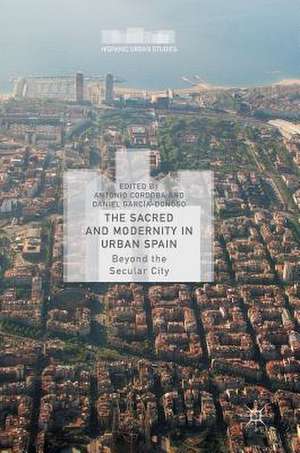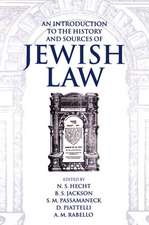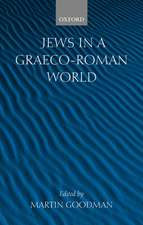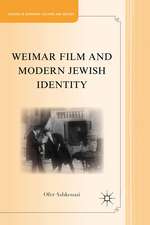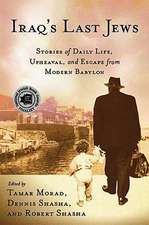The Sacred and Modernity in Urban Spain: Beyond the Secular City: Hispanic Urban Studies
Editat de Antonio Cordoba, Daniel García-Donosoen Limba Engleză Hardback – 2015
| Toate formatele și edițiile | Preț | Express |
|---|---|---|
| Paperback (1) | 635.80 lei 6-8 săpt. | |
| Palgrave Macmillan US – 29 mar 2019 | 635.80 lei 6-8 săpt. | |
| Hardback (1) | 640.24 lei 6-8 săpt. | |
| Palgrave Macmillan US – 2015 | 640.24 lei 6-8 săpt. |
Preț: 640.24 lei
Preț vechi: 753.22 lei
-15% Nou
Puncte Express: 960
Preț estimativ în valută:
122.53€ • 126.58$ • 101.97£
122.53€ • 126.58$ • 101.97£
Carte tipărită la comandă
Livrare economică 25 martie-08 aprilie
Preluare comenzi: 021 569.72.76
Specificații
ISBN-13: 9781137600714
ISBN-10: 1137600713
Pagini: 227
Ilustrații: XXVII, 211 p.
Dimensiuni: 148 x 210 x 18 mm
Greutate: 0.41 kg
Ediția:1st ed. 2015
Editura: Palgrave Macmillan US
Colecția Palgrave Macmillan
Seria Hispanic Urban Studies
Locul publicării:New York, United States
ISBN-10: 1137600713
Pagini: 227
Ilustrații: XXVII, 211 p.
Dimensiuni: 148 x 210 x 18 mm
Greutate: 0.41 kg
Ediția:1st ed. 2015
Editura: Palgrave Macmillan US
Colecția Palgrave Macmillan
Seria Hispanic Urban Studies
Locul publicării:New York, United States
Cuprins
INTRODUCTION; Antonio Cordoba and Daniel García-Donoso.- CHAPTER 1. The Sacred in Madrid’s Soundscape: Towards an Aural Hygiene, 1856-1907; Samuel Llano.- CHAPTER 2. Sacred, Sublime, and Supernatural: Religion and the Spanish Capital in Nineteenth-Century Fantastic Narratives; Wan Sonya Tang.- CHAPTER 3. The Modern Usurer Consecrates the City: Circulation and Displacements in the Torquemada Series; Sara Muñoz-Muriana.- CHAPTER 4. Spirituality and Publicity in Barcelona, 1929: Performing Citizenship between Tradition and Avant-Garde; Alberto Medina.- CHAPTER 5. The Places of the Subject: Abjection and the Transcendent City in Nada and La plaça del Diamant; Sarah Thomas.- CHAPTER 6. Living Off the Exception: Biopolitical Modernity and Sacratio in Francoist Spain; William Viestenz.- CHAPTER 7. Urban Avatars of “El Maligno”: Sacredness in Álex de la Iglesia’s El día de la bestia and Manuel Martín Cuenca’s Caníbal; Antonio Cordoba.- CHAPTER 8. Searching the Soul of the City in Rafael Chirbes’s Crematorio; Daniel García-Donoso.- CHAPTER 9. A New Heaven for a New Earth: Religion in the Contemporary Spanish Novel; Nathan Richardson.- CHAPTER 10. Media Landscapes of a Well-Dressed Multitude: The City and the Individual in Velvet and El tiempo entre costuras; Esteve Sanz and Tatiana Alekseeva.- AFTERWORD. The Temple and the City: Contaminations of the Sacred in Modernista Barcelona; Joan Ramon Resina.
Notă biografică
Antonio Cordoba is Assistant Professor at Manhattan College, USA. His research focuses on the interaction between modernity, wonder, and the sacred in Latin American culture.
Daniel García-Donoso is Assistant Professor at The Catholic University of America, USA. His work explores the relationship between religion and culture in modern and contemporary Spain.
Textul de pe ultima copertă
This book explores how modernity, the urban, and the sacred overlap in fundamental ways in contemporary Spain. Urban spaces have traditionally been seen as the original sites of modernity, history, progress, and a Weberian systematic disenchantment of the world, while the sacred has been linked to the natural, the rural, mythical past origins, and exemption from historical change. This collection problematizes such clear-cut distinctions as overlaps between the modern urban and the sacred in Spanish culture are explored throughout the volume. Placed in the periphery of Europe, Spain has had a complex relationship with the concept of modernity and commonly understood processes of modernization and secularization, thus offering a unique case-study of the interaction between the modern and the sacred in the city.
Caracteristici
Launches a scholarly conversation on the relationship between urban spaces, modernity, and the sacred Connects modern cities to a discussion of the concept of the sacred that is not necessarily related to any specific religion or god Examines literature, film and television, architecture, and the conflicting elements of the urban soundscape in modern Spain Problematizes clear-cut distinctions to show how modernity, the urban, and the sacred overlap fundamentally in contemporary Spain
